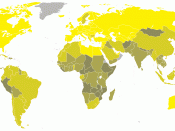Society has significant problems with food choices today, enough that terms like "binge eating" and "fat-free" have become common vocabulary. Sadly, culture blames obesity on the individual. Consider the stereotype that overweight people are lazy, unmotivated, and gluttonous; many people hesitate to reject that statement. In brief, it is often accepted that an imperfect body reflects an imperfect person (Nutrition Action Healthletter, July-Aug. 1998).
Many factors influence our food choices. We are motivated by economics, physiological impulses, genetics, psychological notions, our environment and culture. Each of these affect the way we balance the value we place on taste, nutrition, cost, convenience and weight control when selecting food (Journal of the American Dietetic Association, Oct 1998). Eating behavior that seems irrational on the surface is much better explained when all aspects are considered.
Economic explanations are based on the idea that food choices, eating patterns, and activity levels are choices consumers make each day.
These decisions are influenced by prices, time, and income, as well the conscious and unconscious balancing of tradeoffs between current satisfaction and future health. From this perspective, people eat unhealthy diets because current taste and experience is a higher priority than future health (Nutrition Today, May 2000).
While we have a biological necessity to eat, scientists have been pursuing causes for obesity within the field of genetics. We know that historically, genes guided our ancestors to consume high-calorie foods in order to live through times of scarcity. Bred through thousands of years, it is still inborn for us, despite the general absence of a food shortage. It is likely to take several thousand more years for our ancient genes to adapt to this change. Besides, it may be true that some people are more prone to becoming overweight, but searching for the gene for obesity...



Well done
Intersting paper. I enjoyed reading this paper. Stated a lot of facts and the material is well presented. Good job.
2 out of 2 people found this comment useful.